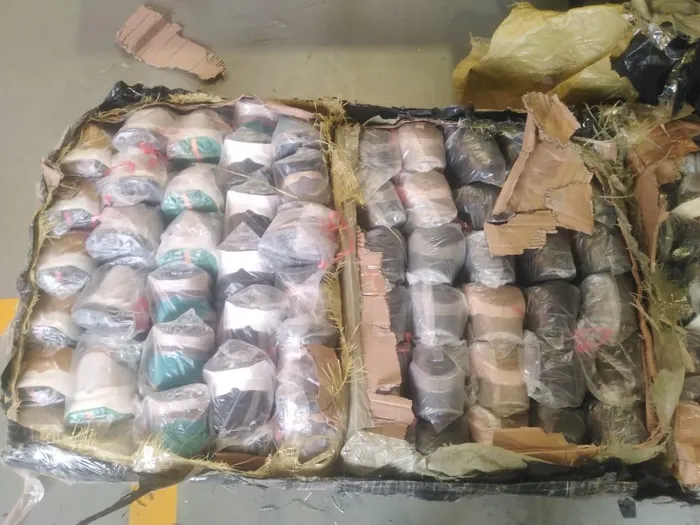
Counterfeit sportswear worth more than R12 million seized by the Hawks during an operation at the Lebombo port of entry. The Durban Chamber of Commerce has raised concern about counterfeit goods flooding the market.
Image: Hawks
The business community in KwaZulu-Natal is on edge over the continuing proliferation of counterfeit goods that undermine job creation, destroy existing jobs and pose serious health risks. Key business chambers have expressed concerns about the influx of counterfeit products and cheap imports into the KZN market.
In a statement, Palesa Phili, the chief executive of the Durban Chamber of Commerce and Industry NPC, expressed deep concern about the recent surge in cheap imports and counterfeit goods entering South Africa’s domestic market, which is widening the trade imbalance and placing immense pressure on our domestic industries.
“We believe this is far from a minor issue – it represents a systemic threat to the economic resilience of both the country and the province. The current situation is escalating into an economic crisis, adversely affecting critical sectors.
“We have observed the following industries struggling under this pressure, with significant impacts on operational viability and competitiveness.”
ALSO READ:
Tax Justice SA warns: South Africa loses R250 million daily to illicit trade
Illicit alcohol trade in SA: A growing crisis draining billions from economy, posing health risks
Phili added that the affected industries included the paper and pulp industry, the solar manufacturing sector, automotive industry, textile and clothing industry and food and beverages sector.
“The impact is significant – domestic manufacturers and businesses are increasingly unable to compete with such low-priced imports. This has the potential to lead to job losses, reduced government revenue, and the collapse of key industries, limiting the country’s potential for sustainable economic growth.
“Our local businesses face financial strain and operational uncertainty. The impact is even more severe for small, medium and micro enterprises (SMMEs), many of which are struggling to survive or are operating at minimal capacity as they face intense competition from cheaper imports,” the chamber concluded.
Melanie Veness, the chief executive of the Pietermaritzburg and Midlands Chamber of Business, said that counterfeit goods were having a devastating effect on the local economy.
“It is estimated that the counterfeit goods market accounts for up to 10% of the South African economy. Apart from the significant loss of tax revenue, legitimate businesses suffer lost sales and often damage to their brands. The unfair competition from these cheaper, fake goods is driving up unemployment as businesses struggle to compete and survive.
“Buying counterfeit goods is bad for our economy, bad for unemployment and often bad for the people who buy them. In industries like food, pharmaceuticals and electronics, these counterfeit products often don’t meet safety standards, which puts consumers at risk.”
A few months ago, Andrew Dickson, engineering executive at CBI-electric: Low Voltage, spoke about the dangers of counterfeit products in the electricity industry.
“Financial pressures in South Africa and across Africa have led to a surge in demand for cheaper products, creating a lucrative market for counterfeiters. This has even extended to electrical goods, which have infiltrated between 40% to 80% of markets on the continent, posing a potentially lethal risk to millions of consumers.
“At best, they simply might not operate, but in the worst case, these products may result in unprotected installations, with burns or electrical shocks being inflicted on users as a result. In severe circumstances, fires or fatalities occur.”
Dr Dickson compared a R50 counterfeit circuit breaker to a genuine one costing R100. “The short-term savings might seem appealing, but the potential repercussions can be severe. A malfunction could lead to damage to property or personal injury, so the total cost of losses from a counterfeit product far exceeds the initial savings gained from their purchase.”
KZN MEC for Economic Development, Tourism and Environment Affairs, Musa Zondi, expressed concern that the flow of counterfeit goods is undermining the local economy.
“We need to be clear about the impact of counterfeit goods. The first casualty is job creation. We have factories in the province that produce certain products.
“When we see these factories closing down and jobs being lost, it’s because of the influx of counterfeit goods. They are costing us jobs and generally undermining the economy.
“For instance, that factory would be operating in the country, paying rent and rates to the municipality, all of which is undermined by counterfeit goods.”
Zondi detailed the health threats associated with counterfeit products.
He said some of these products are consumed and can be deadly because they have not been put through a quality control process. He added that the department recently found a building where a popular alcohol brand was being counterfeited.
Mafika Mndebele, the chairperson of the Economic Development Portfolio Committee in the KZN Legislature, described the counterfeit industry as a serious matter as it destroyed the economy, undermined legitimate businesses, reduced government revenue and discouraged innovation.